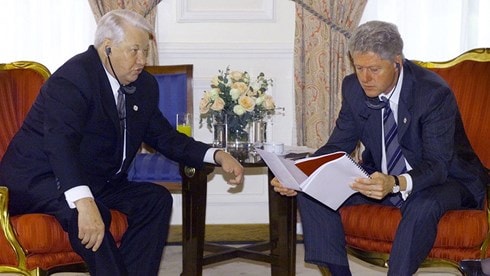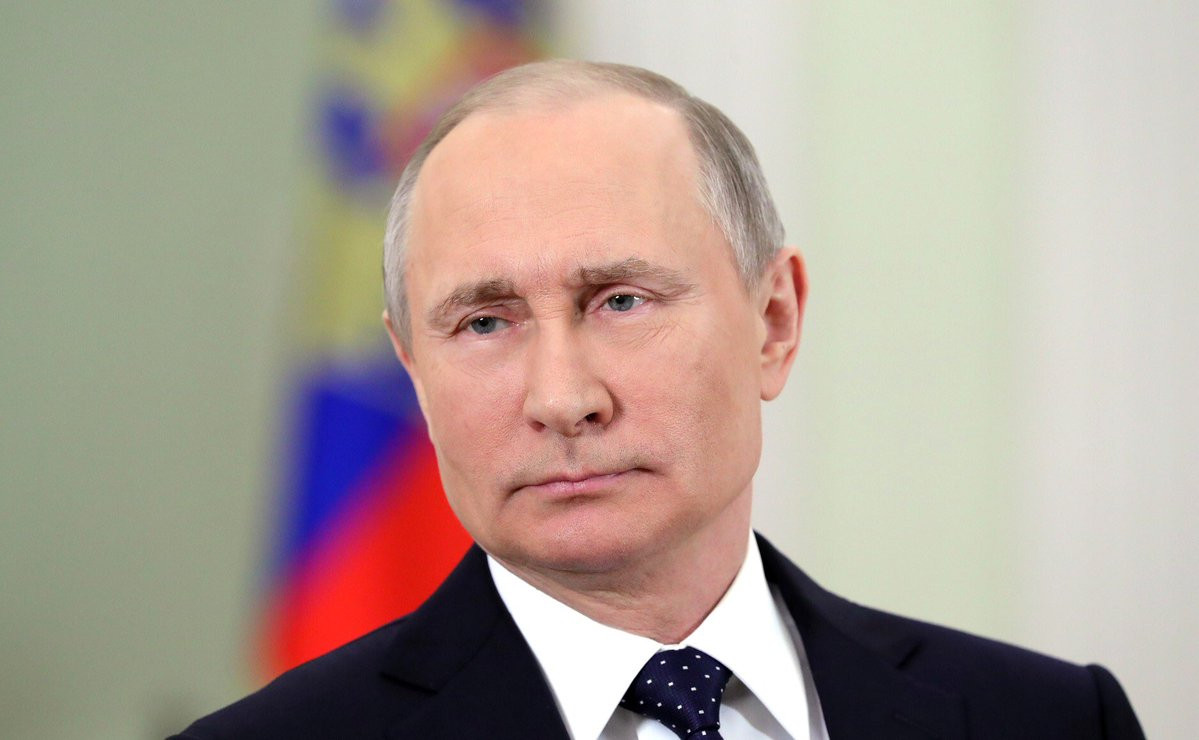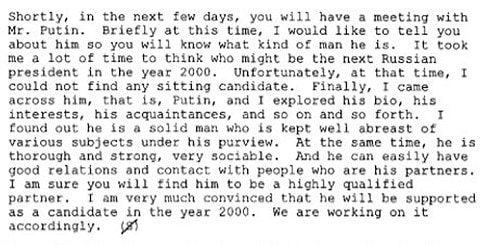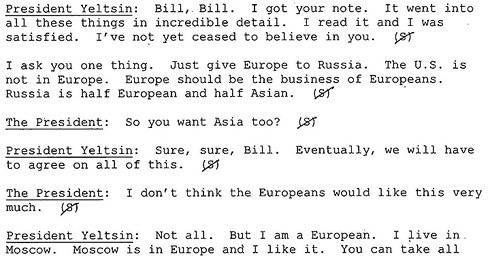Putin - Boris Yeltsin's last "chess piece" that turned the Russia-US relationship around
Declassified nearly 600 pages of notes exchanged between the two former Russian and American presidents revealed the reasons why bilateral relations changed and Mr. Putin came to power.
In 1999, then-Russian President Boris Yeltsin told his counterpart Bill Clinton that he had chosen Vladimir Putin to “succeed” him as Russia’s next leader, declassified documents released by the Bill Clinton Presidential Library in Little Rock, Arkansas, show.
 |
| Russian President Boris Yeltsin meets US President Bill Clinton in November 1999. Photo: Reuters |
The records of 18 private conversations and 58 phone calls (from January 1993, when Mr. Clinton took office as US President, until December 1999, when Mr. Yeltsin resigned) also show the "seeds" of why a Russia-US relationship that Mr. Clinton himself affirmed to Mr. Yeltsin was an "equal cooperative partnership" has led to the current fierce confrontation.
Boris “called”, Bill “did not answer”
“You led your country through a historic period and you leave a legacy that will benefit the Russian people for many years to come,” Mr. Clinton told Mr. Yeltsin in a phone call on December 31, 1999, when the Russian leader unexpectedly announced his resignation.
“I know that the democratic changes he led will help Russia integrate into the international community,” Mr. Clinton said, believing that historians will call Mr. Yeltsin “the father of Russian democracy” who worked “to make the world a safer place.”
However, according to RT, the Russia-US relationship of "equal cooperation partnership" that Mr. Clinton spoke of is actually based on the fact that Moscow has done what Washington asked but has not received any reward.
Mr. Yeltsin offered the United States a lot, from support for Russia's 1996 presidential election to a promise that NATO expansion would not encroach on the territory of the former Soviet republics.
But President Clinton rejected the so-called “gentleman’s pact” on NATO expansion and told President Yeltsin that he had to push for expansion because of domestic politics. Mr. Clinton said the US Republicans were using the issue to win support from the segment of Americans who were descendants of Eastern Europeans who moved to the US Midwest.
Yugoslavia and the fate of Crimea
The US president only appeared more amenable to compromise when Mr Yeltsin's demands involved helping the Russian leader consolidate power in Moscow.
In the run-up to the 1996 election, Mr. Yeltsin painted a doomsday picture of his opponents winning, saying they would “take back Crimea” and even “claim Alaska.”
In June 1996, Mr. Yeltsin asked for a loan and the creditors of the Paris Club (a group of rich countries specializing in lending to rebuild the country) immediately restructured Russia's debt, and the International Monetary Fund (IMF) also approved a loan of 10.2 billion USD for Russia at the end of that year.
“Bill, for my election campaign, I urgently need a loan of $2.5 billion to Russia,” Boris Yeltsin said. “I need money to pay salaries and pensions.”
“I will check this with the IMF and some of our friends to see what can be done,” Mr. Clinton replied.
With American financial backing and a campaign with American advice, which included appearing on the cover of Time magazine and being the subject of a film called “Spinning Boris,” Mr. Yeltsin won that election.
Then came the time for Mr. Yeltsin to repay Mr. Clinton, and that happened in the spring of 1999.
To “silence” Boris Yeltsin, preventing Russia from speaking out against NATO’s attack on Yugoslavia, Mr. Clinton called the then Yugoslav President, Mr. Slobodan Milosevic, “a bully” who should not be allowed to “destroy the relationship that we [Russia and the US] have worked hard to build over the past 6 and a half years.”
During the 78 days and nights of NATO's offensive campaign, Mr. Yeltsin was "sitting on fire" because of the surrounding pressure, to the point that at one point he had to suggest meeting Mr. Clinton "in a secret place somewhere... on a boat or submarine or an island so that no one could disturb" the two leaders' negotiations.
 |
| Mr. Yeltsin wanted to meet Mr. Clinton alone. |
In the end, only President Clinton got everything he asked for on Kosovo and Yugoslavia.
But Mr. Yeltsin also warned the American leader that Washington had lost the “hearts and minds” of the Russian people.
“Our people will certainly have a very bad attitude towards the Americans and NATO from now on,” Mr. Yeltsin told Mr. Clinton in March 1999. “I still remember how difficult it was for me to try and change the minds of the people and political leaders towards the West and towards the United States. I succeeded in doing that, but now I have lost everything.”
Later that year, Yeltsin told Clinton that he had found a worthy successor—Vladimir Vladimirovich Putin.
The man who “continued Yeltsin's path”
In a phone call transcript dated September 8, 1999, Mr. Yeltsin shared with Mr. Clinton his choice for the Russian presidency ahead of the US President's meeting with Mr. Putin.
 |
| Russian President Putin |
“I am very confident that he will receive support as a candidate in 2000. We are working for that,” Mr. Yeltsin said.
The then Russian president also said that he spent a lot of time looking for the right candidate. “Finally, I came across him, it was Putin, and I learned his biography, his interests, his knowledge and many other things,” Mr. Yeltsin said.
Mr Yeltsin described the then 46-year-old candidate as “a solid man” who was also “deep, strong and approachable”.
“I am sure you will find him a very high-quality partner,” Mr. Yeltsin told Mr. Clinton.
 |
| Mr. Yeltsin told Mr. Clinton about Mr. Putin. |
Former US President Bill Clinton and then Russian Prime Minister Vladimir Putin met on the sidelines of the Asia-Pacific Economic Cooperation (APEC) Summit in Auckland, New Zealand, which took place from September 9-12, 1999.
Not long after, in a 1999 conversation, Mr. Clinton asked Mr. Yeltsin who might be elected President of Russia, to which the then Kremlin chief replied: “Putin, of course. He will be the successor. He is a democrat and he understands the West.”
The former Russian President has described Putin as a tough and persistent man on the path towards democracy, economic development and establishing new relationships for Russia.
“He will continue on the path of democracy and economy, will expand Russia’s relations. He has the energy and intelligence to succeed,” Mr. Yeltsin said the last time the two Russian and American leaders met in Istanbul (Turkey) in November 1999.
At that same Summit, Mr. Yeltsin called on Mr. Clinton to “leave Europe to Russia.”
“America is not in Europe. Europe should be a European affair. Russia is half Europe and half Asia… Bill, I am serious, leave Europe to Europe” – Mr. Yeltsin made clear.
 |
| The exchange about Europe between Mr. Trump and Mr. Yeltsin. |
Of course, Mr. Clinton politely ignored that request. And Boris Yeltsin, in the eyes of posterity, became a man who spent nearly 7 years doing everything Washington asked for, with almost nothing in return.
Under Yeltsin, Russia was bankrupt, weak and left the US to enjoy a “unipolar moment” that scholars like Francis Fukuyama called “the end of history”, RT commented.
Yeltsin’s legacy may not lie there. In his final move, he chose a “Yeltsin successor,” under whose rule Crimea was annexed by Russia, and NATO never felt as fearful as it does now of Moscow’s expansion westward, even into the Middle East.
Putin was first elected President of Russia in 2000 and re-elected in 2004, but the Russian Constitution at that time did not allow him to run again in 2008. He became Prime Minister of Russia, and during this time the Constitution was amended to extend the presidential term. In 2012, Putin was once again elected President of Russia and re-elected for another 6-year term last March.

